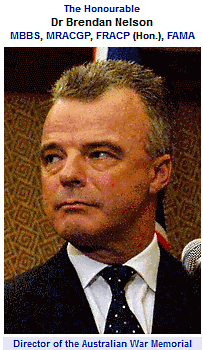|
|
|
|
|
|
|
News & Views item - May 2013 |
![]() Did the Good Dr. Nelson Really Say That. (May 17, 2013)
Did the Good Dr. Nelson Really Say That. (May 17, 2013)
Brendan Nelson is the current Director of the Australian War Memorial. From December 3, 2007 to September 16, 2008 he was leader of the Australian Liberal Party in opposition, but from November 26, 2001 to January 27, 2006 he was the Minister for Education, Science and Training in John Howard's government.
While tunnelling through the TFW archives the other day the following 10˝ year old News and Views from November 25, 2002 appeared -- believe it or not.
_______________________________
Dr. Nelson and the Day After -- Did He Really
Say That? (November 25, 2002)
The day following Prime Minister John Howard's address to the
Committee for the Economic Development of Australia
in Sydney the Minister for Education, Science and Training delivered the
43rd Chapman Oration
to the Institution of Engineers, Australia, Victoria Division.
It was to be expected that in his recurring theme of denial
the crisis in higher education remains a myth. He cited the familiar
obfuscations. Also not unexpected was a number of pointed indications as to his
views regarding the sorts of reforms to higher education that were being
seriously considered.
[I]t is not a question of what will happen in universities this year or next year. It is what sort of Australia will we live in twenty years from now.
There are complex and significant community service obligations on non-research intensive universities in the regions of this country which are not recognised nor funded. At the same time, [for example] Melbourne University, Monash University, QUT ...are competing with the rest of the world and yet we are forcing them into [the same] funding and policy framework.
The Vice Chancellors have said we should have a world class centre for research in each university. The reason for even thinking about a world class university in our country – we already have parts of universities that are world class – not top fifty not top ten but top five or higher. The reason is if we want a world class university it will never be delivered under the current policy and financing framework.
I ...attended a dinner with the executive of the Australian Vice Chancellor’s Committee and said to my then Chief of Staff, as we drove back to Parliament House late that evening, "I think we are going to have to do something for our future and it is going to be hard but we are going to have to reform Australian higher education".
However, just as a you're feeling as though you were listening to an extended Verdi aria -- you've heard the refrain at least three times before -- something shocks you wide awake.
What I am going to take to offer to my [Cabinet] colleagues is a small number of broad thematic [research] priorities. Do we, for example, want Australia to be an environmentally sustainable continent? If we do what sort of research might we need? We’d need engineering technologies. We’d need environmental engineering. We’d need geosciences, engineering fuel technologies, maths and physics and social sciences to influence and inform human behaviour. That is the kind of priority setting process that I am putting to my colleagues...[T]he Germans in 1973 said "let’s be a world leader in pharmaceuticals." Twenty years later their international share of the pharmaceutical industry had declined from 17% to 8%. In contrast you look at the US where investment in knowledge for its own sake in a strong and deregulated economy draws knowledge out of the university sector. That is the kind of thing we need to be looking at - although we do need to prioritise what we are doing. ...That is the general basis upon which I am trying to build our future.
And while you're making sure that you've read what's before you correctly, though perhaps wondering how pushing Australia's research university vice-chancellors around dovetails with lauding the US approach, Dr Nelson sneaks in the punch line:
Our war against terrorism has not only got to be fought with sniffer dogs and high tech surveillance and military hardware. It is also a war against what Socrates described as the root of all evil and that is ignorance. So one of the things I am trying to do is to persuade our country and to persuade my colleagues to not lose sight of what in the end is at the basis of all of that which drives the uncertainty in our world of fundamentalist intolerance and that is ignorance.
Well, it will be interesting to see, once Dr.
Nelson joins his colleagues in Cabinet, just how persuasive he is when it comes
to providing adequate resources to overcome the crisis in higher education. For
example, can anyone look objectively at the current trajectory of staffing
numbers in the enabling sciences or the decline in secondary school student
interest, and claim there's no crisis? You're kidding.
Of course he did say, "[I]t is not a question of what will happen in universities this year or next year. It is what sort of Australia will we live in twenty years from now." So we just may have to wait a while.